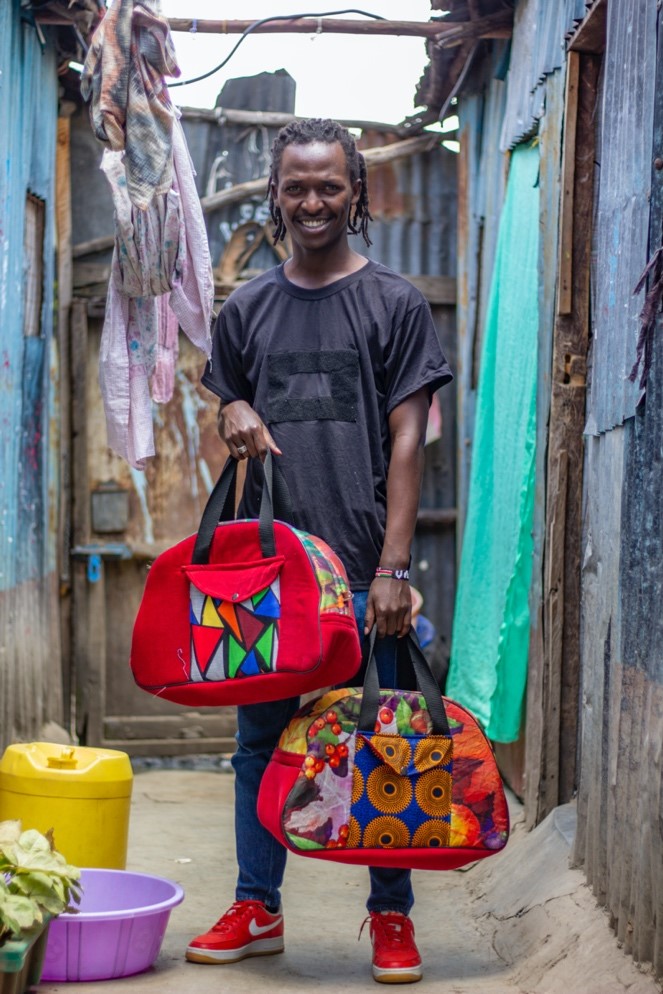Graduate turned from his English and Linguistics degree, to pursue what he had grown seeing his mother do daily to make a living.
Kelvin Mbaluto would have given anything not to have the long holidays when he was pursuing his bachelor’s degree in English and Linguistics with a minor in Psychology at Kenyatta University. This is why.
“I always got letters of recommendation for internship from the university, then I would walk all over town looking for a job opportunity or work placement and I would not find any” he says.
After getting fatigued from knocking the doors of organizations and getting many instances of definite “no” and a half-hearted “call us next week”, Kelvin turned his energy on something that came so natural to him because he had grown up seeing his mother practice it: tailoring.
His mother who has since retired, was a seamstress whose tailoring shop was based in Imara Daima, an area adjacent to Mukuru slums in Nairobi. He explains: “I decided to start small on tailoring because I have loved doing it since my childhood, I was always sewing small items using my mother’s sewing machine and kits when I was younger.”
Kelvin had also informal training in understanding textiles and fabrics while selling secondhand clothes in the university as a way of earning some money for his fees and upkeep allowances.
However, Kelvin’s light bulb moment came while going about his duties looking for an extra coin to survive the difficulties of a Kenyan campus life. There was a backpack that he loved which became worn out after its prolonged use. He did not have money to buy a new one.
Scratching his head on how he would refurbish his bag, Kelvin took to YouTube from where he watched tutorials to augment his skills in sewing bags. Since then, the viewing platform has been his ‘go-to’ online learning reference.
Manual Machine
“I ended up undoing the bag and putting it back together with patches of African fabric.” Kelvin shares. The reaction from his school mates about the bag convinced him that he was on to something with the sewing skills. They requested him for similar bags, and they then spread the word about him and his skill.

It was around this time that the organization U-TENA youth group called for proposals from youth groups so that they would be mentored through a project called Mtaani Initiative (connoting initiative in the hood). U-TENA at the time had received grant support from Kenya Community Development Foundation (KCDF) to provide access to sustainable employment to disadvantaged young people through their creative talent as well as promote ‘art-prenuership’ in informal settlements.
Kelvin decided to participate in the initiative, carrying his branded bags to every skills training meeting. He also volunteered to teach young people who were similarly in his craft about sewing in these same meetings.
After graduation from Kenyatta University, the linguistic bought a second-hand sewing machine, a humble beginning because he remembered every detail of it: the machine head was manual, it cost him Kes. 5,000 ($50), and the brand was Butterfly. His mother loaned him the sewing table to complete the set.
When he began sewing and selling the bags, orders become more than the manual machine could handle, and hence the need to advance to an industrial machine.
The young entrepreneur worked a deal with his mother to handle his new fortunes. They agreed that he would use the electronic machines at his mother’s workshop and pay the electricity bills in return. The work increased even further, and he bought his own industrial machines, a Juki brand that cost him Kes. 25,000 ($250) to add to the two machines at his mother’s shop.
Ambitions Bigger than Workshop
In no time, work increased, and he set-up his own workshop in Mukuru bringing on-board five of his protégé from the Mtaani Initiative where he was training young people on his craft. As he and one more cut and did the finishes, the other two sew and helped with making the packaging bags. The only lady was made in charge of the marketing.
As fortune would have it, in 2017 U-TENA called for a second round of proposals, This time for funding of youth businesses. Kelvin received a Kes. 200,000 ($2000) grant after successfully submitting a business concept to expand his business. With some financial muscle, Kelvin branded his business as Outde Designs complete with a logo and branded packing bags. Outde makes backpacks, totes, laptop pouches and wallets with Ankara and other African fabrics.
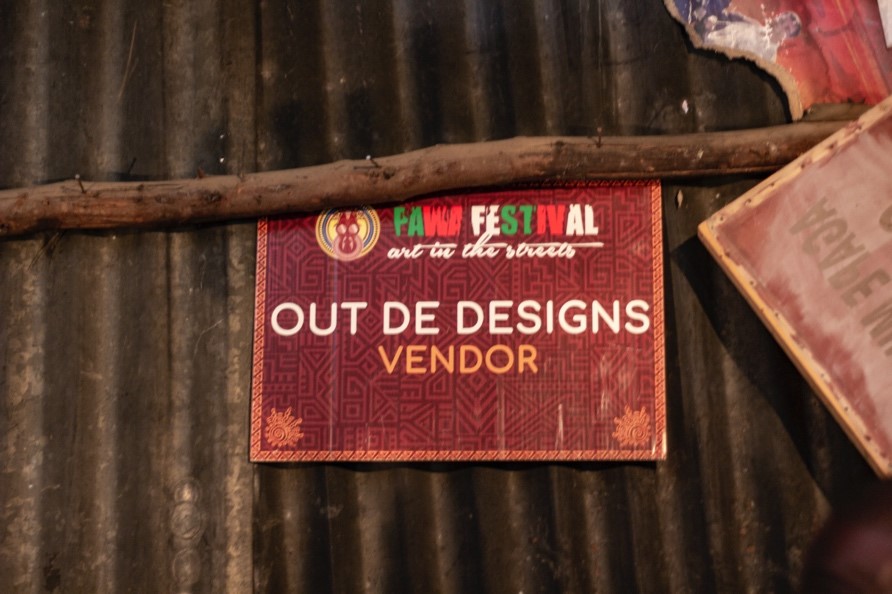
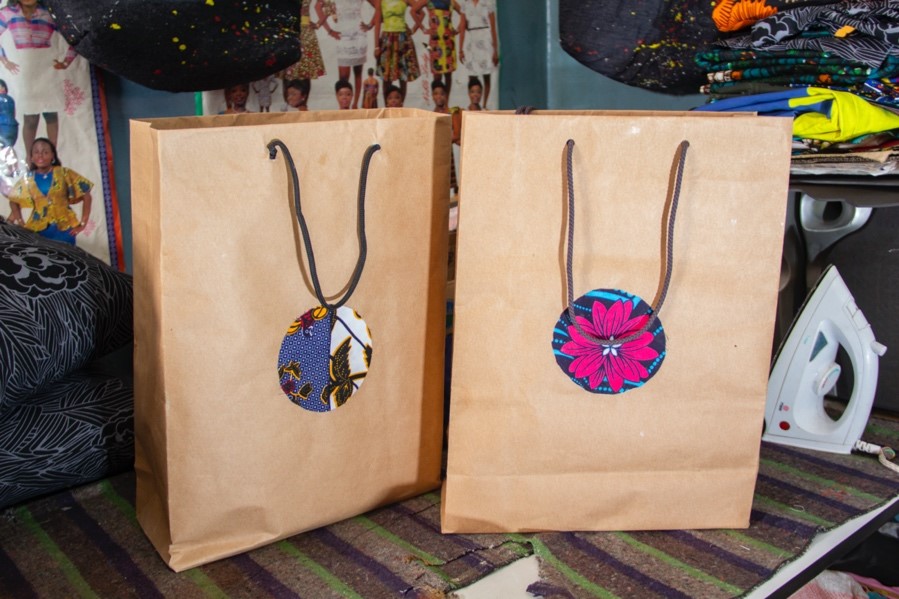
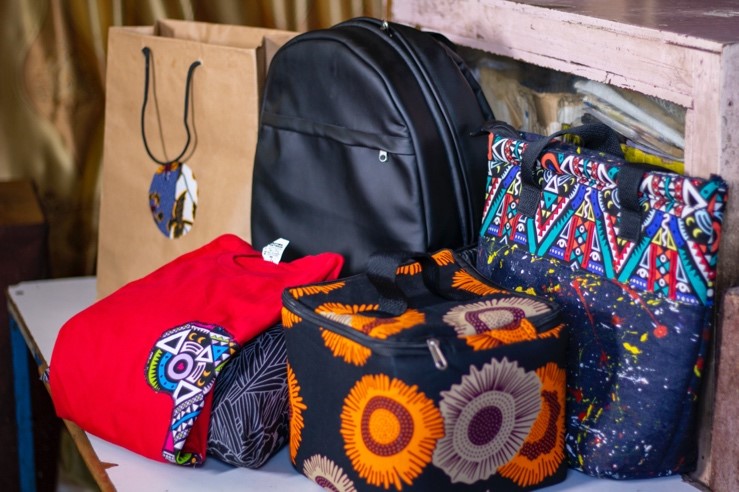
He took his marketing a notch higher by collaborating with fashion models and online influencers who would use his bags for their photoshoots, credit his work and in return, give him the high definition photos for his social media pages.
Kelvin’s dreams are bigger than his workshops.
He says confidently: “The following two years, I am looking to have expand this workshop, employ more than the five people that I have here now, and they can even work in shifts.”
The linguist turned designer is aggressively saving towards having his own outlet, where he says people will buy his products whenever they visit the shop. This is his greatest ambition though.
“I will stock my outlet with purely African themed products, not mixed, just purely African,” he declares.
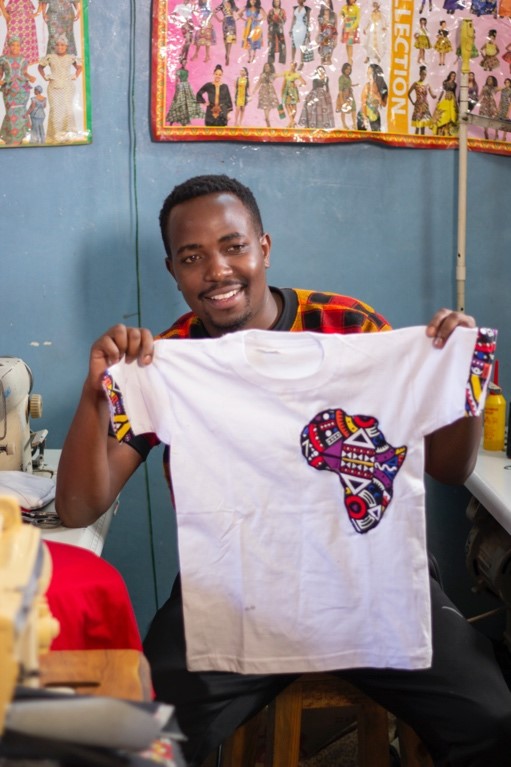
Kelvin says he is eternally grateful to the KCDF and U-TENA partnership which in turn supported his dreams.
